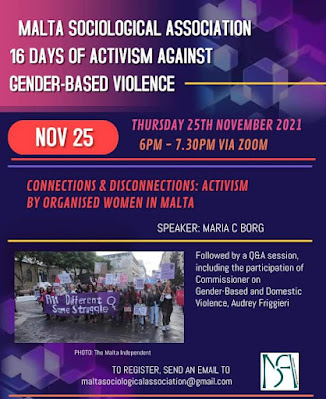The Malta Sociological Association (MSA, registered Voluntary Organisation) has submitted its feedback to the Ministry for Research, Innovation and the Co-ordination of Post Covid-19 Strategy about the Public Consultation on Thematic Areas underpinning Malta’s National Post Pandemic Strategy
MSA welcomed the drift of the public consultation, adding that this should be an ongoing process and not just a one off exercise.
Whilst we fully understand the government’s need to plan a timeline to return to a post-covid situation, we recommend that this should be interpreted as a social process with various opportunities, risks, changes and impacts which take place across time and space. It is also important to take heed of lessons learned during the process and to value the intersection of medical, economic, social, political, cultural, and other factors at individual, community, local, societal, national, and transnational levels.
In this regard, MSA proposes that the consultation exercise employs an ongoing social impact assessment process for all areas, to ensure greater outreach and deliberation with stakeholders. An SIA could produce valuable evidence for policy formation and implementation.
We emphasize that this should not be one-off exercise: To the contrary, assessments should be ongoing processes which engage with various stakeholders and which report back so as to ensure effective policy processes. They should also use complementary research methods so as to ensure reliable and valid data.
Various methods, both quantitative and qualitative could be used within social impact assessments. The former refers to generalisable data especially through numbers, while the latter produce in-depth data on matters. Research methods in SIAs may therefore include, for example, quantitative perception surveys and qualitative methods which involve a deeper look into social realities.
Besides, expert interviews may verify the advice, concerns and interpretations of persons who are experts or who have experience in the respective field under analysis.
SIAs should involve the participation of different stakeholders, ideally through mixed research methods. Analytic indicators should be provided and the entire process should be subject to peer review by independent experts in the field. This means that if a study is being carried out by a team of scientists (social, natural etc.), this should be scrutinised by other independent scientists. This could help identify shortcomings and possible improvements to the same SIA.
In its feedback, the MSA referred to international SIA standards, for example those set by the International Association for Impact Assessment, which is accessible from this link:









